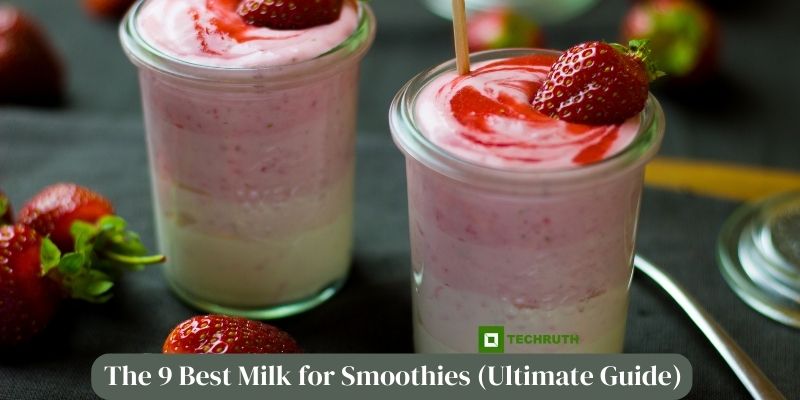Smoothies have become a popular go-to choice for a quick and nutritious meal or snack. With their endless possibilities and health benefits, smoothies offer a convenient way to pack in essential nutrients and vitamins. One of the key ingredients that can make or break a smoothie is the choice of milk. From dairy to plant-based options, the type of milk you choose can significantly impact the flavor, texture, and overall nutritional value of your smoothie. In this ultimate guide, we will provide the 9 best milk for smoothies.
9 Best Milk for Smoothies
Almond Milk
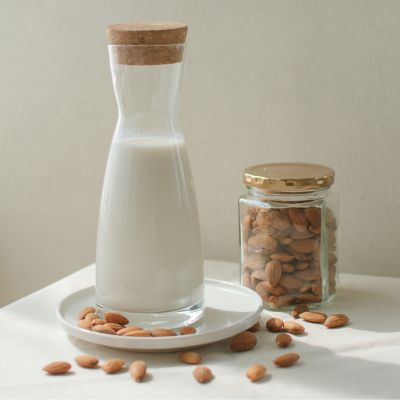
Almond milk is popular among smoothie enthusiasts due to its subtle nutty flavor and creamy texture. Made from almonds and water, this plant-based milk is naturally lactose-free and a great option for those with lactose intolerance or dairy allergies. Almond milk is also low in calories, making it an ideal choice for those watching their weight. Additionally, it contains essential vitamins and minerals, such as vitamin E, calcium, and magnesium, which can support bone health and overall well-being.
Benefits
- Almond milk is lower in calories than cow’s milk, making it a suitable option for those looking to manage their calorie intake.
- Almond milk is a great alternative for individuals who are lactose intolerant or have dairy allergies.
- It contains essential vitamins and minerals, including vitamin E, calcium, and magnesium, which can promote heart health and support bone strength.
- The low calorie and fat content of almond milk can help with weight loss or weight maintenance efforts.
- Almond milk is rich in antioxidants, such as vitamin E, which can protect cells from damage caused by free radicals.
Coconut Milk

Coconut milk is renowned for its rich and tropical flavor, adding a delicious twist to any smoothie. Made from the flesh of mature coconuts, this creamy milk offers a luscious texture and a natural sweetness. Coconut milk is a great source of medium-chain triglycerides (MCTs), which can provide a quick source of energy and support metabolism. It also contains iron, potassium, and magnesium, promoting heart health and muscular function. However, due to its higher fat content, it’s best to use coconut milk in moderation, especially if you are calorie-conscious.
Benefits
- Coconut milk offers a rich and creamy texture, making it a fantastic addition to smoothies, curries, and desserts.
- Coconut milk is a good source of MCTs, which can provide quick energy and support weight management.
- It is an excellent milk substitute for those with lactose intolerance or dairy allergies.
- Coconut milk contains lauric acid, which can help boost the immune system and fight off harmful pathogens.
- Coconut milk contains healthy fats that can raise HDL (good) cholesterol levels and lower LDL (bad) cholesterol levels, promoting heart health.
Soy Milk
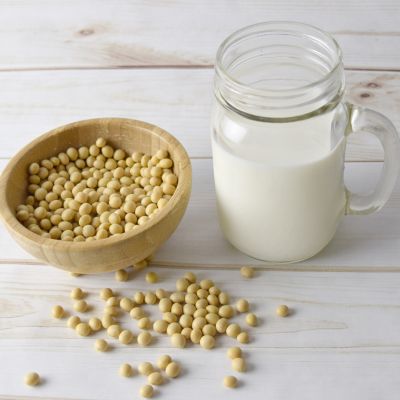
Soy milk is a classic plant-based milk known for its high protein content and smooth texture. Derived from soybeans, it provides a substantial amount of complete proteins, making it an excellent choice for vegans and vegetarians. Soy milk is rich in antioxidants, including isoflavones, which have been linked to various health benefits, such as reducing the risk of certain cancers and promoting heart health. It also contains essential nutrients like calcium and vitamin D, contributing to strong bones and a healthy immune system.
Benefits
- Soy milk is a plant-based milk that provides a good amount of protein, making it an excellent option for vegetarians and vegans.
- It contains all essential amino acids required by the body for various physiological functions.
- Soy milk is often fortified with calcium and vitamin D, contributing to strong bones and preventing osteoporosis.
- It has been associated with a reduced risk of heart disease due to its ability to lower LDL cholesterol levels.
- Soy milk contains natural compounds called isoflavones, which have antioxidant and anti-inflammatory properties.
Oat Milk

Oat milk has gained popularity in recent years for its creamy consistency and mild flavor. Made from soaked and blended oats, this dairy-free alternative is an excellent source of fiber, which can aid in digestion and promote a feeling of fullness. Oat milk is also rich in beta-glucans, a type of soluble fiber that may help lower cholesterol levels and improve heart health. Furthermore, it’s often fortified with essential nutrients like vitamin B12 and calcium, making it a nutritionally sound option for smoothies.
Benefits
- Oat milk has a naturally creamy texture and a neutral flavor, making it a versatile milk alternative for various recipes.
- Oat milk is rich in dietary fiber, which supports digestion and helps maintain a feeling of fullness.
- It is suitable for individuals with lactose intolerance or nut allergies.
- Oat milk has been shown to help reduce LDL cholesterol levels and support heart health.
- Oat milk is often fortified with vitamins and minerals, such as vitamin B12 and calcium, enhancing its nutritional profile.
Cashew Milk
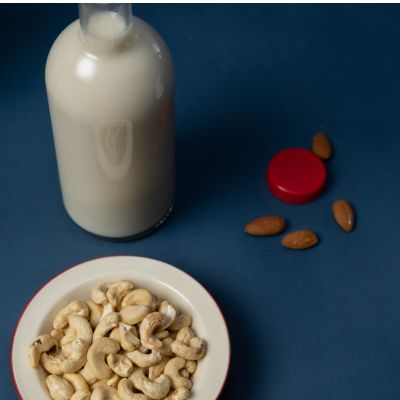
Cashew milk is a creamy and nutty plant-based milk made from blended cashews and water. It’s a fantastic alternative to dairy milk, especially for those with lactose intolerance or dairy allergies. Cashew milk has a smooth texture that works wonderfully in smoothies, providing a rich and velvety consistency.
Benefits
- Cashew milk is low in calories and fat, making it suitable for those watching their calorie intake.
- It contains essential nutrients such as calcium, magnesium, and potassium, contributing to bone health and muscle function.
- Cashews are a good source of healthy fats, including monounsaturated fats, which can support heart health.
Hemp Milk
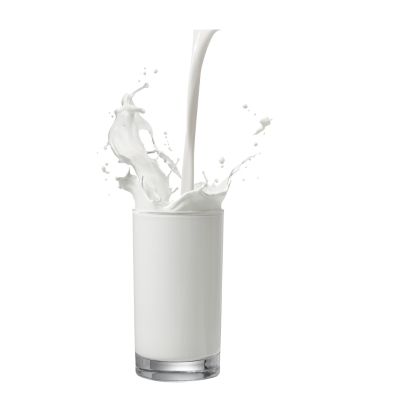
Hemp milk is made from hemp seeds and water, creating a slightly nutty and earthy flavor. It’s a great option for those looking for a dairy-free and soy-free milk alternative. Hemp milk is rich in omega-3 and omega-6 fatty acids, making it a nutritious addition to smoothies.
Benefits
- Hemp milk is a complete protein source, containing all nine essential amino acids necessary for muscle repair and growth.
- It is high in omega fatty acids, which have anti-inflammatory properties and may support heart and brain health.
- Hemp milk is naturally rich in vitamins and minerals, including vitamin E, phosphorus, and magnesium.
Rice Milk
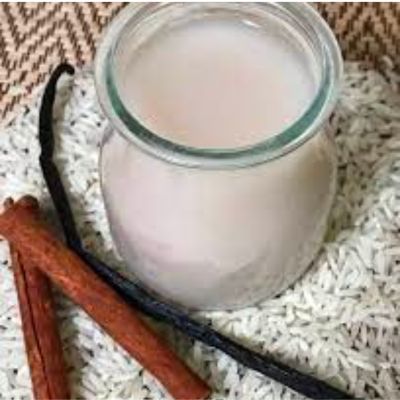
Rice milk is made from milled rice and water, creating a naturally sweet and light milk option. It’s an excellent choice for individuals with multiple food allergies, as it’s free from dairy, soy, nuts, and gluten. Rice milk has a thin consistency, so it’s best combined with other creamy ingredients in smoothies.
Benefits
- Rice milk is easily digestible, making it suitable for those with sensitive stomachs or digestive issues.
- It is naturally low in fat and cholesterol, making it a heart-healthy option.
- Rice milk is often fortified with essential nutrients, such as calcium and vitamin D, to support bone health.
Macadamia Nut Milk
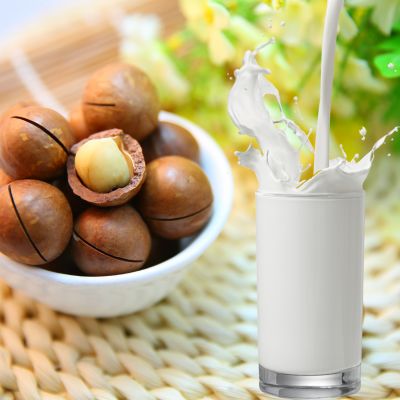
Macadamia nut milk is a rich and creamy plant-based milk made from macadamia nuts and water. It has a luxurious texture and a slightly sweet, buttery flavor that pairs well with various smoothie ingredients. Macadamia nut milk is a great alternative to dairy milk for those seeking a unique and indulgent smoothie experience.
Benefits
- Macadamia nuts are a good source of monounsaturated fats, which can promote heart health and lower bad cholesterol levels.
- The milk contains essential vitamins and minerals, including vitamin B6, thiamine, and manganese, supporting various bodily functions.
- Macadamia nut milk is low in carbohydrates and contains no cholesterol, making it suitable for certain dietary restrictions.
Flaxseed Milk
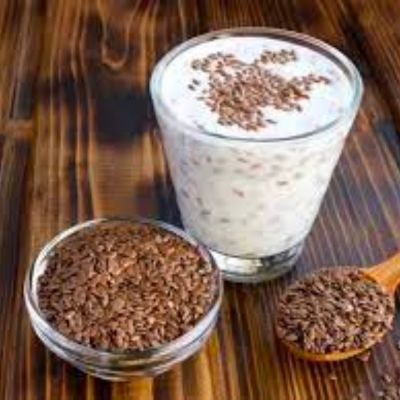
Flaxseed milk is a plant-based milk made from ground flaxseeds and water. It has a mild, nutty flavor and a smooth texture that blends well with different smoothie ingredients. Flaxseed milk is an excellent option for those looking to add more plant-based omega-3 fatty acids to their diet.
Benefits
- Flaxseeds are rich in alpha-linolenic acid (ALA), a type of omega-3 fatty acid that may support heart health and reduce inflammation.
- Flaxseed milk is a good source of dietary fiber, promoting healthy digestion and supporting weight management.
- The milk is often fortified with vitamins and minerals, such as calcium and vitamin D, to enhance its nutritional value.
Conclusion
Choosing the right milk for your smoothies can elevate your blending experience and boost the nutritional value of your beverage. Whether you prefer the nutty undertones of almond milk, the tropical twist of coconut milk, the protein punch of soy milk, or the creaminess of oat milk, each option offers a unique set of benefits. Consider your dietary preferences and health goals when selecting the best milk for your smoothies. You can improve your smoothie recipes’ online visibility and enhance your chances of reaching smoothie enthusiasts searching for the ultimate guide on the best milk for their blending adventures. Cheers to a delicious and nutritious smoothie journey!
You may also like:
Jasmine Milk Tea Recipe With Honey Boba
Green Smoothies for Weight Loss
FAQs
Q:- Can I use water instead of milk in my smoothie?
Ans:- Yes, you can use water instead of milk in your smoothie. However, using milk can add extra nutrients and creaminess to your smoothie.
Q:- Is dairy milk bad for you?
Ans:- Dairy milk can be a healthy part of a balanced diet for those who are not lactose intolerant or have a dairy allergy. It’s high in protein and calcium, which can help support bone health.
Q:- Is almond milk a good source of protein?
Ans:- No, almond milk is not a good source of protein. If you’re looking to add more protein to your smoothie, you may want to consider a different milk option or add a protein powder.
Q:- Can I mix different types of milk in my smoothie?
Ans:- Yes, you can mix different types of milk in your smoothie. Experiment with different combinations to find your perfect blend!
Q:- Can I make my own milk for my smoothie?
Ans:- Yes, you can make your own milk for your smoothie using nuts, seeds, or grains. This can be a fun and creative way to customize your smoothie.
Q:- Are smoothies a healthy meal replacement?
Ans:- Smoothies can be a healthy meal replacement when made with nutritious ingredients. Ensure your smoothie includes a balance of protein, healthy fats, fruits, and vegetables to make it a satisfying and nutrient-rich meal option.
